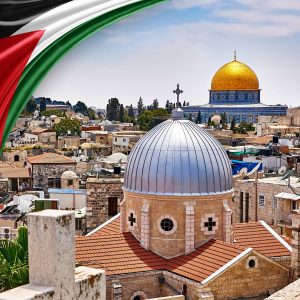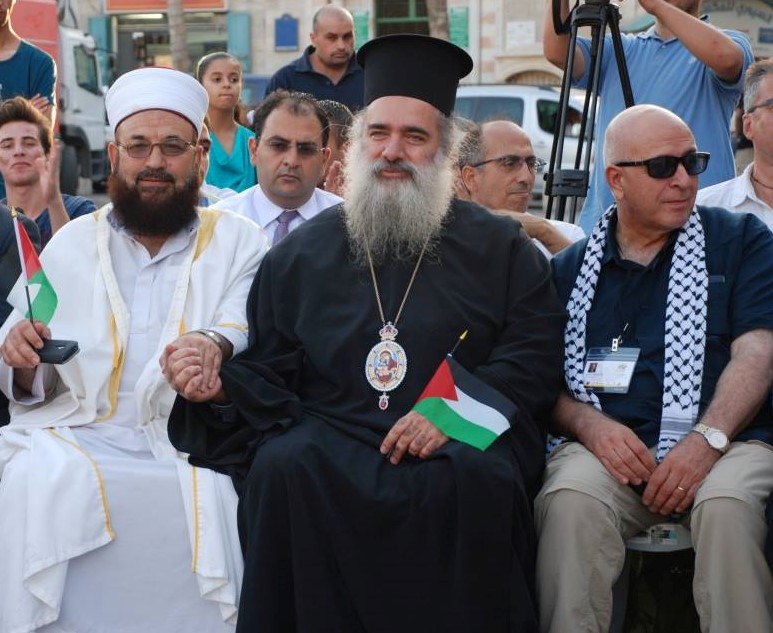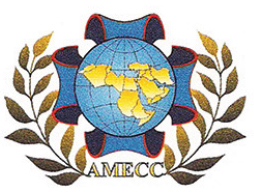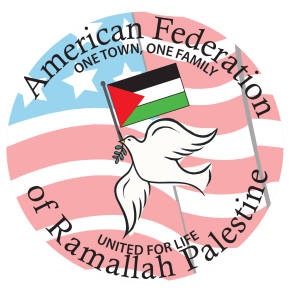
Our Call to Action
Background
Christians and other indigenous religious minorities are an integral part of the Middle East. For example, Arab Palestinians shared a common civilization and culture with their neighbors. They became some of the very first followers of Jesus Christ and, centuries later, experienced the birth and development of Islam!
Historically, Middle Eastern Christians and Muslims have lived peacefully as neighbors and fellow citizens. Their common lives were built on a rich blend of Christian and Muslim values and practices. Additionally, the two monotheistic faiths are compatible and anchored in similar foundations of respecting human dignity, caring for each other, and calling followers to love their neighbors. We witness this congruence in the interfaith community of Palestine where Christians and Muslims coexist in solidarity, aiding and protecting one another despite differences in creed.
Muslims and Christians also stand with tolerant Muslims – who make up the vast majority in the Middle East – against discrimination, persecution, and violence. Unfortunately, many in the West have wrongly associated the Middle East particularly and the Muslim world in general with religious extremism. “Islamists,” as they are called, have hijacked Islam for their own political desires, convincing some that Muslims should commit violence against others while promoting oppressive and exclusivist ideologies. This contradicts a long history of Muslim tolerance and promotion of diversity. As the Qur’an (2:256) instructs:
Let there be no compulsion in religion: Truth stands out clear from Error: whoever rejects evil and believes in God hath grasped the most trustworthy hand-hold that never breaks. And God heareth and knoweth all things!
Arab Christians living in the Middle East are a key bridge for positive East-West relations. Over the decades, they have been proactive in building interfaith tolerance and in educating Western Christians about the real Islam, distinguishing faithful people of good will from extremists. They have argued that the ideological and political factors that have disrupted religious coexistence throughout the world are not the norm, but rather a divergence from the truth.
Moreover, Christians and Muslims agree on the centrality of Jerusalem to the three monotheistic faiths of Judaism, Christianity, and Islam. For them, the Holy City has a universal character. Her presence and appeal are essential for peace and reconciliation in the world. Her soul and spirit embrace all people, equally.
Correspondingly, Jerusalem’s inhabitants deserve a dignified life and the fulfillment of their daily needs, such as housing, jobs, education, medical care, municipal services, and cultural activities. Their access to their religious sites – including Al-Aqsa Mosque and Dome of the Rock for Muslims, the Holy Sepulchre for Christians, and the Western Wall for Jews – must be facilitated. They are entitled to legal protection and equality before the law as well as to their inherent civil liberties and political rights.
Therefore, Christians and Muslims are urged to come together to advance coexistence and peace. They must promote their shared values by combating Islamophobia, showing the West that religious extremists are a very tiny minority that does not represent the majority of peaceful Muslims. Christians and Muslims must band together in defense of Christians and other religious minorities that are subject to extremist violence and oppression and that are denied their legal rights and due process under the law. Moreover, Christians and Muslims are asked to stand in solidarity with their brothers and sisters in Jerusalem, Palestine, and the rest of the Holy Land.
We have a sacred trust. We have significant responsibilities. We extend an open invitation to all people of goodwill to join us in this call to action.
CMC Mission
We, Muslims and Christians, commit ourselves to putting our faith into action by continuing to promote peaceful coexistence and by supporting our shared priority to advocate for peace and justice for the Palestinian people and to dedicate ourselves to combating anti-Muslim and Islamophobic biases.
CMC Goals

Our mission is achieved through more intentional, systematic, and long-term efforts. Hence, we set the following ten goals:
- Amplify the Voice of Victims, Amplify the Voice of Arab Christians and Muslims – Palestinian Christians and Muslims have been suffering for too long under the harsh conditions of the Israeli occupation. They must be empowered to share their stories. Conversely, Westerners need to hear these stories, which are often suppressed in the media and in public discourses on the conflict.
- Stand in Solidarity with the Palestinian People – Christians and Muslims alike have been toiling for decades under Israeli occupation and the divisions in Palestinian society. It is essential not to abandon the Palestinian people but to lend them moral, financial, and other forms of assistance that will enable them to overcome adversity and actualize their dream of freedom, independence, and statehood.
- Correct Negative Perceptions of Islam (Islamophobia) – The CMC Network commits to combating anti-Muslim and Islamophobic biases in various venues, including the media, the entertainment industry, and public discourse.
- Reclaim the legitimate Muslim voice to defend Christians – Muslims within this coalition recognize that Islam is being misconstrued by the few extremists to justify their dastardly acts. We feel an even stronger call to action than our Christian brothers and sisters to remain steadfast in challenging extremism in our name to persecute our Arab and Middle Eastern Christians.
- Provide and Share Models of Hope – Despite the tragic repercussions of extremists, there are beacons of hope with communities (e.g., Muslims helping persecuted Christians, the Palestinian Christian/Muslim solidarity model) in existence. By providing a spotlight on these models, we look forward to emboldening and encouraging others to replicate these efforts and help existing efforts gain valuable resources (both human and financial) to expand their good works.
- Facilitate Interfaith Coordination and Communication – The CMCaspires to serve as a liaison among mosques, Islamic centers, and churches in advocating on behalf of Palestinian dignity and self-determination. It also seeks opportunities to work together with synagogues, Jewish groups, and other faith-based organizations that support Palestinian rights.
- Develop Grassroots (People to People) Relationships – Both Christian and Muslim leaders recognize that “the Church” and “the Umma” are not buildings or ideas. They are people. It is not enough for religious scholars and leaders to make statements without follow-up action. Opportunities must be created for all to become actively engaged in this campaign in the form of a grassroots movement.
- Ensure Resiliency – While the persecution of Christians is a serious crisis in a number of regions, once the crisis is addressed, it will be important to advance coexistence by planting the seeds of peace within the youth to ensure that this never happens again.
- Preserve Jerusalem’s inclusivity – Mobilize Christians, Muslims, Jews, and others to advocate for upholding Jerusalem’s religious Status Quo and to maintain her as the inclusive center of faith. Jerusalem is humanity’s shared gift governed by two peoples and cherished by three faiths.
- Honor our Creator – Islam and Christianity are centered on our Creator. We commit to keeping His Will in all our actions knowing that doing so is the best witness to His Mercy and Grace and will serve as the differentiation from those that have hijacked His Name against the Common Good.
CMC Programs
In support of our goals, CMC operates the following three programs:
- Interfaith Dialogue and Educational Events (e.g., Conferences, and Symposia): These allow CMC members as well as religious and community leaders to participate in face-to-face dialogue and fellowship. These also involve expert speakers and specialists to explain the challenges facing Palestinian Christians and Muslims and the ways they work together in solidarity. The dialogue is outcome-focused to inspire members to renew their commitment and provide practical ways to support the Palestinian people.
- The “Ambassador of Peace” Program (APP): This consists of an Interfaith Youth Leadership opportunity for American Muslim and Christian youth to travel together to the Holy Land. During their shared journey, they engage in interfaith dialogue and participate in workshops and events that build coexistence and friendship. The participants are encouraged to become Ambassadors of Peace in their communities upon their return home.
- Familiarization Trips to the Holy Land: Many Muslims feel uncomfortable or unwelcome in Israel. However, Christians who regularly go on pilgrimages to the Holy Land enjoy the enrichment of religious conviction that comes from walking the hallowed ground of their faith. To correct this inequity, the CMC seeks to offer Muslims the same opportunity. Through its relations with Christian partners in the Holy Land, the CMC can assist in organizing religious journeys for Muslims in coordination with the local Christian and Muslim communities, allowing Muslims to visit such holy sites as Al-Aqsa Mosque, Dome of the Rock, and the tombs of important prophets and martyrs, among others. Since its inception, thousands of American Christians and Muslims have participated in these familiarization trips.
CMC Network
The CMC Network consists of the following constituencies:
- Mosques and Islamic centers
- Churches from All dominations
- Islamic and Christians organizations
- Clergy Muslims and Christians
- Friends of CMC from other faiths and interfaith entities
- Individual Muslims and Christians










